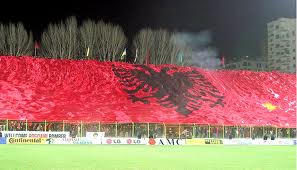By Andrew Warshaw
February 18 – Kosovan footballing authorities are hoping to persuade Manchester United’s rising teenage star Adnan Januzaj to play in their symbolic first ever meaningful international friendly.
Earlier this year the breakaway Balkan state celebrated a major breakthrough after FIFA finally cleared the national team and clubs to play friendly matches after a long-running dispute that was in danger of derailing progress.
Kosovo promptly set up its first international against Haiti in Mitrovica on March 5 and want Januzaj, 19, to play even though he has the option of Albania, Belgium, Turkey, Serbia and, potentially in the future, even England.
If Januzaj agrees, it would not jeopardise his international career since only competitive games prevent a player from later representing another nation.
“The invitation is symbolic,” the Kosovo FA (FKK) said in a statement. FKK general secretary Eroll Salihu revealed his federation had spoken to Januzaj’s father and uncle to assure them the teenager would be free to choose another country in the future.
Januzaj was born in Belgium and has Kosovan-Albanian parents while his grandparents are Turkish. The teenager could theoretically also play for England by 2018 because FIFA rules allow a player to represent a country if he has lived there continuously for at least five years after reaching the age of 18.
“We believe that he is obliged to show his people that he will be there when needed in a historic moment,” Salihi said. “Januzaj’s appearance would simply show that he has not forgotten his people, even if he only plays for 10 or 15 minutes.”
Kosovo declared independence from Serbia in 2008 and has been recognised by at least 100 countries including 23 of the European Union’s members. It has yet to become a member of the United Nations and is not a member of either FIFA or UEFA but supporters say its frustration is understandable since a number of exiled players turn out for other national teams, notably Switzerland.
Originally, FIFA agreed in principle in May 2012 to allow its member associations to play friendlies against teams from Kosovo but backtracked following a protest from the Serbian authorities. Instead, permission was watered down to allow Kosovo to play friendly matches at “youth, amateur, women’s and club football”.
Even that, however, was jeopardised by FIFA’s insistence that all flags and national symbols – as well as the national anthem – be banned, with no games staged on Kosovar soil “without the prior authorisation” of Serbia.
Some of those restrictions remain. Kosovo will still not, for instance, be allowed to play matches against clubs and representative teams of other countries of the former Yugoslavia until further notice. Also, Kosovan teams may still not display national symbols or play national anthems and teams from Kosovo must give 21 days’ notice of scheduled home matches, and FIFA will inform the Serbia football federation.
Contact the writer of this story at moc.l1745635017labto1745635017ofdlr1745635017owedi1745635017sni@w1745635017ahsra1745635017w.wer1745635017dna1745635017

